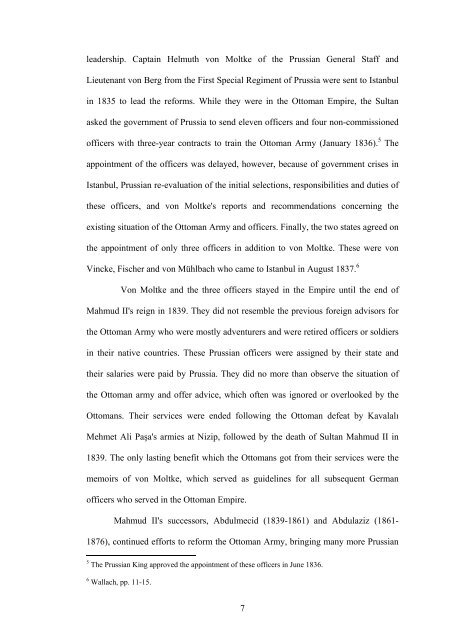the beginnings of ottoman-german partnership - Bilkent University
the beginnings of ottoman-german partnership - Bilkent University
the beginnings of ottoman-german partnership - Bilkent University
You also want an ePaper? Increase the reach of your titles
YUMPU automatically turns print PDFs into web optimized ePapers that Google loves.
leadership. Captain Helmuth von Moltke <strong>of</strong> <strong>the</strong> Prussian General Staff and<br />
Lieutenant von Berg from <strong>the</strong> First Special Regiment <strong>of</strong> Prussia were sent to Istanbul<br />
in 1835 to lead <strong>the</strong> reforms. While <strong>the</strong>y were in <strong>the</strong> Ottoman Empire, <strong>the</strong> Sultan<br />
asked <strong>the</strong> government <strong>of</strong> Prussia to send eleven <strong>of</strong>ficers and four non-commissioned<br />
<strong>of</strong>ficers with three-year contracts to train <strong>the</strong> Ottoman Army (January 1836). 5 The<br />
appointment <strong>of</strong> <strong>the</strong> <strong>of</strong>ficers was delayed, however, because <strong>of</strong> government crises in<br />
Istanbul, Prussian re-evaluation <strong>of</strong> <strong>the</strong> initial selections, responsibilities and duties <strong>of</strong><br />
<strong>the</strong>se <strong>of</strong>ficers, and von Moltke's reports and recommendations concerning <strong>the</strong><br />
existing situation <strong>of</strong> <strong>the</strong> Ottoman Army and <strong>of</strong>ficers. Finally, <strong>the</strong> two states agreed on<br />
<strong>the</strong> appointment <strong>of</strong> only three <strong>of</strong>ficers in addition to von Moltke. These were von<br />
Vincke, Fischer and von Mühlbach who came to Istanbul in August 1837. 6<br />
Von Moltke and <strong>the</strong> three <strong>of</strong>ficers stayed in <strong>the</strong> Empire until <strong>the</strong> end <strong>of</strong><br />
Mahmud II's reign in 1839. They did not resemble <strong>the</strong> previous foreign advisors for<br />
<strong>the</strong> Ottoman Army who were mostly adventurers and were retired <strong>of</strong>ficers or soldiers<br />
in <strong>the</strong>ir native countries. These Prussian <strong>of</strong>ficers were assigned by <strong>the</strong>ir state and<br />
<strong>the</strong>ir salaries were paid by Prussia. They did no more than observe <strong>the</strong> situation <strong>of</strong><br />
<strong>the</strong> Ottoman army and <strong>of</strong>fer advice, which <strong>of</strong>ten was ignored or overlooked by <strong>the</strong><br />
Ottomans. Their services were ended following <strong>the</strong> Ottoman defeat by Kavalalı<br />
Mehmet Ali Paşa's armies at Nizip, followed by <strong>the</strong> death <strong>of</strong> Sultan Mahmud II in<br />
1839. The only lasting benefit which <strong>the</strong> Ottomans got from <strong>the</strong>ir services were <strong>the</strong><br />
memoirs <strong>of</strong> von Moltke, which served as guidelines for all subsequent German<br />
<strong>of</strong>ficers who served in <strong>the</strong> Ottoman Empire.<br />
Mahmud II's successors, Abdulmecid (1839-1861) and Abdulaziz (1861-<br />
1876), continued efforts to reform <strong>the</strong> Ottoman Army, bringing many more Prussian<br />
5 The Prussian King approved <strong>the</strong> appointment <strong>of</strong> <strong>the</strong>se <strong>of</strong>ficers in June 1836.<br />
6 Wallach, pp. 11-15.<br />
7
















